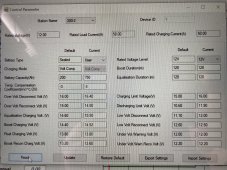Bowlegs868
New Member
I have an Epever VS6048AU charge controller and on it's technical sheet I saw that the low voltage disconnect for the batteries is at 11.1V (for sealed, gel and flooded)
This is a big problem, right???!
If it's allowing the batteries to discharge that low before disconnecting (and I have already had to deal with battery issues twice), then this will not work out well for me
Also, I'm getting different PV voltage readings on the charge controller (82V) vs my multimeter (78V)... any thoughts on which would be more accurate?
This is a big problem, right???!
If it's allowing the batteries to discharge that low before disconnecting (and I have already had to deal with battery issues twice), then this will not work out well for me
Also, I'm getting different PV voltage readings on the charge controller (82V) vs my multimeter (78V)... any thoughts on which would be more accurate?



